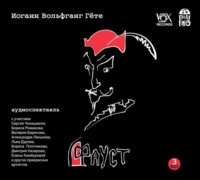 полная версия
полная версияAutobiography: Truth and Fiction Relating to My Life
I had been born and bred in the Upper-German dialect; and although my father always labored to preserve a certain purity of language, and, from our youth upwards, had made us children attentive to what may be really called the defects of that idiom, and so prepared us for a better manner of speaking, I retained nevertheless many deeper-seated peculiarities, which, because they pleased me by their /naïvete/, I was fond of making conspicuous, and thus every time I used them incurred a severe reproof from my new fellow-townsmen. The Upper-German, and perhaps chiefly he who lives by the Rhine and Main (for great rivers, like the seacoast, always have something animating about them), expresses himself much in similes and allusions, and makes use of proverbial sayings with a native common-sense aptness. In both cases he is often blunt: but, when one sees the drift of the expression, it is always appropriate; only something, to be sure, may often slip in, which proves offensive to a more delicate ear.
Every province loves its own dialect; for it is, properly speaking, the element in which the soul draws its breath. But every one knows with what obstinacy the Misnian dialect has contrived to domineer over the rest, and even, for a long time, to exclude them. We have suffered for many years under this pedantic tyranny, and only by reiterated struggles have all the provinces again established themselves in their ancient rights. What a lively young man had to endure from this continual tutoring, may be easily inferred by any one who reflects that modes of thought, imagination, feeling, native character, must be sacrificed with the pronunciation which one at last consents to alter. And this intolerable demand was made by men and women of education, whose convictions I could not adopt, whose injustice I thought I felt, though I was unable to make it plain to myself. Allusions to the pithy biblical texts were to be forbidden me, as well as the use of the honest-hearted expressions from the Chronicles. I had to forget that I had read the "Kaiser von Geisersberg," and eschew the use of proverbs, which nevertheless, instead of much fiddle-faddle, just hit the nail upon the head, – all this, which I had appropriated to myself with youthful ardor, I was now to do without: I felt paralyzed to the core, and scarcely knew any more how I had to express myself on the commonest things. I was, moreover, told that one should speak as one writes, and write as one speaks; while to me, speaking and writing seemed once for all two different things, each of which might well maintain its own rights. And even in the Misnian dialect had I to hear many things which would have made no great figure on paper.
Every one who perceives in this the influence which men and women of education, the learned, and other persons who take pleasure in refined society, so decidedly exercise over a young student, would be immediately convinced that we were in Leipzig, even if it had not been mentioned. Each one of the German universities has a particular character; for, as no universal cultivation can pervade our fatherland, every place adheres to its own fashion, and carries out, even to the last, its own characteristic peculiarities: exactly the same thing holds good of the universities. In Jena and Halle roughness had been carried to the highest pitch: bodily strength, skill in fighting, the wildest self-help, was there the order of the day; and such a state of affairs can only be maintained and propagated by the most universal riot. The relations of the students to the inhabitants of those cities, various as they might be, nevertheless agreed in this, that the wild stranger had no regard for the citizen, and looked upon himself as a peculiar being, privileged to all sorts of freedom and insolence. In Leipzig, on the contrary, a student could scarcely be any thing else than polite, as soon as he wished to stand on any footing at all with the rich, well- bred, and punctilious inhabitants.
All politeness, indeed, when it does not present itself as the flowering of a great and comprehensive mode of life, must appear restrained, stationary, and, from some points of view, perhaps, absurd; and so those wild huntsmen from the Saale22 thought they had a great superiority over the tame shepherds on the Pleisse.23 Zachariä's "Renommist" will always be a valuable document, from which the manner of life and thought at that time rises visibly forth; as in general his poems must be welcome to every one who wishes to form for himself a conception of the then prevailing state of social life and manners, which was indeed feeble, but amiable on account of its innocence and child-like simplicity.
All manners which result from the given relations of a common existence are indestructible; and, in my time, many things still reminded us of Zachariä's epic poem. Only one of our fellow-academicians thought himself rich and independent enough to snap his fingers at public opinion. He drank acquaintance with all the hackney-coachmen, whom he allowed to sit inside the coach as if they were gentlemen, while he drove them on the box; thought it a great joke to upset them now and then, and contrived to satisfy them for their smashed vehicles as well as for their occasional bruises; but otherwise he did no harm to any one, seeming only to make a mock of the public /en masse/. Once, on a most beautiful promenade-day, he and a comrade of his seized upon the donkeys of the miller in St. Thomas's square: well-dressed, and in their shoes and stockings, they rode around the city with the greatest solemnity, stared at by all the promenaders, with whom the glacis was swarming. When some sensible persons remonstrated with him on the subject, he assured them, quite unembarrassed, that he only wanted to see how the Lord Christ might have looked in a like case. Yet he found no imitators and few companions.
For the student of any wealth and standing had every reason to show himself attentive to the mercantile class, and to be the more solicitous about the proper external forms, as the colony24 exhibited a model of French manners. The professors, opulent both from their private property and from their liberal salaries, were not dependent upon their scholars; and many subjects of the state, educated at the government schools or other gymnasia, and hoping for preferment, did not venture to throw off the traditional customs. The neighborhood of Dresden, the attention thence paid to us, and the true piety of the superintendent of the course of study, could not be without a moral, nay, a religious, influence.
At first this kind of life was not repugnant to me: my letters of introduction had given me the /entrée/ into good families, whose circle of relatives also received me well. But as I was soon forced to feel that the company had much to find fault with in me, and that, after dressing myself in their fashion, I must now talk according to their tongue also; and as, moreover, I could plainly see that I was, on the other hand, but little benefited by the instruction and mental improvement I had promised myself from my academical residence, – I began to be lazy, and to neglect the social duties of visiting, and other attentions; and indeed I should have sooner withdrawn from all such connections, had not fear and esteem attached me firmly to Hofrath Böhme, and confidence and affection to his wife. The husband, unfortunately, had not the happy gift of dealing with young people, of winning their confidence, and of guiding them, for the moment, as occasion might require. When I visited him I never got any good by it: his wife, on the contrary, showed a genuine interest in me. Her ill health kept her constantly at home. She often invited me to spend the evening with her, and knew how to direct and improve me in many little external particulars: for my manners were good, indeed; but I was not yet master of what is properly termed /étiquette/. Only one friend spent the evenings with her; but she was much more dictatorial and pedantic, for which reason she displeased me excessively: and, out of spite to her, I often resumed those unmannerly habits from which the other had already weaned me. Nevertheless she always had patience enough with me, taught me piquet, ombre, and similar games, the knowledge and practice of which is held indispensable in society.
But it was in the matter of taste that Madame Böhme had the greatest influence upon me, – in a negative way truly, yet one in which she agreed perfectly with the critics. The Gottsched waters25 had inundated the German world with a true deluge, which threatened to rise up, even over the highest mountains. It takes a long time for such a flood to subside again, for the mire to dry away; and as in any epoch there are numberless aping poets, so the imitation of the flat and watery produced a chaos, of which now scarcely a notion remains. To find out that trash was trash was hence the greatest sport, yea, the triumph, of the critics of those days. Whoever had only a little common sense, was superficially acquainted with the ancients, and was somewhat more familiar with the moderns, thought himself provided with a standard scale which he could everywhere apply. Madame Böhme was an educated woman, who opposed the trivial, weak, and commonplace: she was, besides, the wife of a man who lived on bad terms with poetry in general, and would not even allow that of which she perhaps might have somewhat approved. She listened, indeed, for some time with patience, when I ventured to recite to her the verse or prose of famous poets who already stood in good repute, – for then, as always, I knew by heart every thing that chanced in any degree to please me; but her complaisance was not of long duration. The first whom she outrageously abused were the poets of the Weisse school, who were just then often quoted with great applause, and had delighted me very particularly. If I looked more closely into the matter, I could not say she was wrong. I had sometimes even ventured to recite to her, though anonymously, some of my own poems; but these fared no better than the rest of the set. And thus, in a short time, the beautiful variegated meadows at the foot of the German Parnassus, where I was fond of luxuriating, were mercilessly mowed down; and I was even compelled to toss about the drying hay myself, and to ridicule that as lifeless which, a short time before, had given me such lively joy.
Without knowing it, Professor Morus came to strengthen her instructions. He was an uncommonly gentle and friendly man, with whom I became acquainted at the table of Hofrath Ludwig, and who received me very pleasantly when I begged the privilege of visiting him. Now, while making inquiries of him concerning antiquity, I did not conceal from him what delighted me among the moderns; when he spoke about such things with more calmness, but, what was still worse, with more profundity than Madame Böhme; and he thus opened my eyes, at first to my greatest chagrin, but afterwards to my surprise, and at last to my edification.
Besides this, there came the Jeremiads, with which Gellert, in his course, was wont to warn us against poetry. He wished only for prose essays, and always criticised these first. Verses he treated as a sorry addition: and, what was the worst of all, even my prose found little favor in his eyes; for, after my old fashion, I used always to lay, as the foundation, a little romance, which I loved to work out in the epistolary form. The subjects were impassioned, the style went beyond ordinary prose, and the contents probably did not display any very deep knowledge of mankind in the author; and so I stood in very little favor with our professor, although he carefully looked over my labors as well as those of the others, corrected them with red ink, and here and there added a moral remark. Many leaves of this kind, which I kept for a long time with satisfaction, have unfortunately, in the course of years, at last disappeared from among my papers.
If elderly persons wish to play the pedagogue properly, they should neither prohibit nor render disagreeable to a young man any thing which gives him pleasure, of whatever kind it may be, unless, at the same time, they have something else to put in its place, or can contrive a substitute. Everybody protested against my tastes and inclinations; and, on the other hand, what they commended to me lay either so far from me that I could not perceive its excellencies, or stood so near me that I thought it not a whit better than what they inveighed against. I thus became thoroughly perplexed on the subject, and promised myself the best results from a lecture of Ernesti's on "Cicero de Oratore." I learned something, indeed, from this lecture, but was not enlightened on the subject which particularly concerned me. What I demanded was a standard of opinion, and thought I perceived that nobody possessed it; for no one agreed with another, even when they brought forward examples: and where were we to get a settled judgment, when they managed to reckon up against a man like Wieland so many faults in his amiable writings, which so completely captivated us younger folks?
Amid this manifold distraction, this dismemberment of my existence and my studies, it happened that I took my dinners at Hofrath Ludwig's. He was a medical man, a botanist; and his company, with the exception of Morus, consisted of physicians just commencing or near the completion of their studies. Now, during these hours, I heard no other conversation than about medicine or natural history, and my imagination was drawn over into quite a new field. I heard the names of Haller, Linnaeus, Buffon, mentioned with great respect; and, even if disputes often arose about mistakes into which it was said they had fallen, all agreed in the end to honor the acknowledged abundance of their merits. The subjects were entertaining and important, and enchained my attention. By degrees I became familiar with many names and a copious terminology, which I grasped more willingly as I was afraid to write down a rhyme, however spontaneously it presented itself, or to read a poem, for I was fearful that it might please me at the time, and that perhaps immediately afterwards, like so much else, I should be forced to pronounce it bad.
This uncertainty of taste and judgment disquieted me more and more every day, so that at last I fell into despair. I had brought with me those of my youthful labors which I thought the best, partly because I hoped to get some credit by them, partly that I might be able to test my progress with greater certainty; but I found myself in the miserable situation in which one is placed when a complete change of mind is required, – a renunciation of all that one has hitherto loved and found good. However, after some time and many struggles, I conceived so great a contempt for my labors, begun and ended, that one day I burnt up poetry and prose, plans, sketches, and projects, all together on the kitchen hearth, and threw our good old landlady into no small fright and anxiety by the smoke which filled the whole house.
SEVENTH BOOK
About the condition of German literature of those times so much has been written, and so exhaustively, that every one who takes any interest in it can be completely informed; in regard to it critics agree now pretty well; and what at present I intend to say piecemeal and disconnectedly concerning it, relates not so much to the way in which it was constituted in itself, as to its relation to me. I will therefore first speak of those things by which the public is particularly excited; of those two hereditary foes of all comfortable life, and of all cheerful, self-sufficient, living poetry, – I mean, satire and criticism.
In quiet times every one wants to live after his own fashion: the citizen will carry on his trade or his business, and enjoy the fruits of it afterwards; thus will the author, too, willingly compose something, publish his labors, and, since he thinks he has done something good and useful, hope for praise, if not reward. In this tranquillity the citizen is disturbed by the satirist, the author by the critic; and peaceful society is thus put into a disagreeable agitation.
The literary epoch in which I was born was developed out of the preceding one by opposition. Germany, so long inundated by foreigners, interpenetrated by other nations, directed to foreign languages in learned and diplomatic transactions, could not possibly cultivate her own. Together with so many new ideas, innumerable foreign words were obtruded necessarily and unnecessarily upon her; and, even for objects already known, people were induced to make use of foreign expressions and turns of speech. The German, having run wild for nearly two hundred years in an unhappy tumultuary state, went to school with the French to learn manners, and with the Romans in order to express his thoughts with propriety. But this was to be done in the mother-tongue, when the literal application of those idioms, and their half-Germanization, made both the social and business style ridiculous. Besides this, they adopted without moderation the similes of the southern languages, and employed them most extravagantly. In the same way they transferred the stately deportment of the prince-like citizens of Rome to the learned German small-town officers, and were at home nowhere, least of all with themselves.
But as in this epoch works of genius had already appeared, the German sense of freedom and joy also began to stir itself. This, accompanied by a genuine earnestness, insisted that men should write purely and naturally, without the intermixture of foreign words, and as common intelligible sense dictated. By these praiseworthy endeavors, however, the doors and gates were thrown open to an extended national insipidity, nay, – the dike was dug through by which the great deluge was shortly to rush in. Meanwhile, a stiff pedantry long stood its ground in all the four faculties, until at last, much later, it fled for refuge from one of them to another.
Men of parts, children of nature looking freely about them, had therefore two objects on which they could exercise themselves, against which they could labor, and, as the matter was of no great importance, give a vent to their petulance: these were, – a language disfigured by foreign words, forms, and turns of speech on the one hand, and the worthlessness of such writings as had been careful to keep themselves free from those faults on the other; though it occurred to nobody, that, while they were battling against one evil, the other was called on for assistance.
Liskow, a daring young man, first ventured to attack by name a shallow, silly writer, whose awkward demeanor soon gave him an opportunity to proceed still more severely. He then went farther, and constantly aimed his scorn at particular persons and objects, whom he despised and sought to render despicable, – nay, even persecuted them with passionate hatred. But his career was short; for he soon died, and was gradually forgotten as a restless, irregular youth. The talent and character shown in what he did, although he had accomplished little, may have seemed valuable to his countrymen; for the Germans have always shown a peculiar pious kindliness to talents of good promise, when prematurely cut off. Suffice it to say, that Liskow was very soon praised and recommended to us as an excellent satirist, who could have attained a rank even above the universally beloved Rabener. Here, indeed, we saw ourselves no better off than before; for we could discover nothing in his writings, except that he had found the silly, silly, which seemed to us quite a matter of course.
Rabener, well educated, grown up under good scholastic instruction, of a cheerful, and by no means passionate or malicious, disposition, took up general satire. His censure of the so-called vices and follies springs from the clear views of a quiet common sense, and from a fixed moral conception of what the world ought to be. His denunciation of faults and failings is harmless and cheerful; and, in order to excuse even the slight boldness of his writings, it is supposed that the improving of fools by ridicule is no fruitless undertaking.
Rabener's personal character will not easily appear again. As an able, punctual man of business, he does his duty, and thus gains the good opinion of his fellow-townsmen and the confidence of his superiors; along with which, he gives himself up to the enjoyment of a pleasant contempt for all that immediately surrounds him. Pedantic /literati/, vain youngsters, every sort of narrowness and conceit, he banters rather than satirizes; and even his banter expresses no contempt. Just in the same way does he jest about his own condition, his misfortune, his life, and his death.
There is little of the aesthetic in the manner in which this writer treats his subjects. In external forms he is indeed varied enough, but throughout he makes too much use of direct irony; namely, in praising the blameworthy and blaming the praiseworthy, whereas this figure of speech should be used but extremely seldom; for, in the long run, it becomes annoying to clear-sighted men, perplexes the weak, while indeed it pleases the great middle class, who, without any special expense of mind, can fancy themselves more knowing than others. But whatever he brings before us, and however he does it, alike bears witness to his rectitude, cheerfulness, and equanimity; so that we always feel prepossessed in his favor. The unbounded applause of his own times was a consequence of such moral excellencies.
That people looked for originals to his general descriptions and found them, was natural; that individuals complained of him, followed from the above; his lengthy apologies that his satire is not personal, prove the spite it provoked. Some of his letters crown him at once as a man and an author. The confidential epistle in which he describes the siege of Dresden, and how he loses his house, his effects, his writings, and his wigs, without having his equanimity in the least shaken or his cheerfulness clouded, is highly valuable; although his contemporaries and fellow-citizens could not forgive him his happy turn of mind. The letter where he speaks of the decay of his strength and of his approaching death is in the highest degree worthy of respect; and Rabener deserves to be honored as a saint by all cheerful, intelligent men, who cheerfully resign themselves to earthly events.
I tear myself away from him reluctantly, yet I would make this remark: his satire refers throughout to the middle class; he lets us see here and there that he is also well acquainted with the higher ranks, but does not hold it advisable to come in contact with them. It may be said, that he has had no successor, that no one has been found who could consider himself equal or even similar to him.
Now for criticism! and first of all for the theoretic attempts. It is not going too far when we say that the ideal had, at that time, escaped out of the world into religion; it scarcely even made its appearance in moral philosophy; of a highest principle of art no one had a notion. They put Gottsched's "Critical Art of Poetry" into our hands; it was useful and instructive enough, for it gave us a historical information of all the kinds of poetry, as well as of rhythm and its different movements: the poetic genius was presupposed! But, besides that, the poet was to have acquirements and even learning: he should possess taste, and every thing else of that kind. They directed us at last to Horace's "Art of Poetry: " we gazed at single golden maxims of this invaluable work, but did not know in the least what to do with it as a whole, or how we should use it.
The Swiss stepped forth as Gottsched's antagonists: they must take it into their heads to do something different, to accomplish something better; accordingly we heard that they were, in fact, superior. Breitinger's "Critical Art of Poetry" was taken in hand. Here we reached a wider field, but, properly speaking, only a greater labyrinth, which was so much the more tiresome, as an able man, in whom we had confidence, was driving us about in it. Let a brief review justify these words.
For poetry in itself they had been able to find no fundamental axiom: it was too spiritual and too volatile. Painting, an art which one could hold fast with one's eyes, and follow step by step with the external senses, seemed more favorable for such an end: the English and French had already theorized about plastic art; and, by a comparison drawn from this, it was thought that poetry might be grounded. The former presented images to the eye, the latter to the imagination: poetical images, therefore, were the first thing which was taken into consideration. People began with comparisons, descriptions followed, and only that was expressed which had always been apparent to the external senses.









